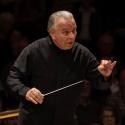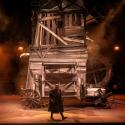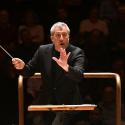
Wolfgang Sandner's sleeve notes rightly mention the “extreme frugality of expressive resources” in the music of the Armenian composer Tigran Mansurian. This sounds like a put down, but the clarity, the lack of superficiality only adds to the power of the works collected here. Mansurian's Concerto no 2 “Four Serious Songs” dates from 2006, and its Brahms-referencing title hints at the work's gravity. There's real beauty here. Patricia Kopatchinskaja's sublime solo line weaves in and out of the narrative, sometimes cooperating and elsewhere at odds with the orchestra. There's a breathtaking moment near the close of the concerto's second movement when she bends the tutti strings to her will, the anger subsiding into a rapt, still dialogue. One of Mansurian's directions for the closing section is molto semplice, and Kopatchinskaja's playing nails it - the stratospheric cantilena unfolding with flawless security. Equally marvellous is the 2012 Quasi parlando for cello and strings, Anja Lechner's flawless cello line communicating ever more closely with its spare accompaniment.
Mansurian's melodic gift dominates in these two recent works. He doesn't deal in dense argument; the soloists speak, the orchestral responding like a restrained Greek chorus. An understated, ethereal Romance for violin and strings is the most accessible item on this disc, a Lark Ascending for the 21st century. ECM also give us his Double Concerto for violin and cello. Composed in 1978, it's a tougher, more formidable listen, though still compelling. Colourful, taut support from Candida Thompson's Amsterdam players, and nicely recorded.
How should Sibelius's orchestral music sound? Are these symphonies late romantic farewells or visionary, progressive statements? There's no one answer. Sumptuously recorded cycles by the likes of Maazel and Bernstein still merit a listen, and the adventurous should seek out Gennadi Rozhdestvensky's blazing 1970s Moscow set, complete with blaring Russian brass. Each of the seven occupies a very distinct sound world, and, as with Mahler, it's difficult to find a conductor who gets them all right. John Storgårds' readings of nos 1 and 2 don't entirely convince – both works can happily accommodate a more indulgent approach and these performances can feel a little too neat and well-behaved. Move onto the later symphonies and the results are much more involving. Storgårds' penchant for swift tempi and clean textures pays enormous dividends, and the BBC Philharmonic play their hearts out. Clear articulation in lower strings makes the bustling opening of no 3 erupt with joy, and the steady build up to the return of the main theme is wonderfully done. No 4's introduction is properly stark, with beefy, muscular lower strings.This work needn't be all darkness and gloom. There's a ripe, romantic heart beating underneath all the terse compression, and Storgårds lets the slow movement's fruity climax sing out.
No 5's stealthy transitions are well managed, though I'd have appreciated brassier horns in the finale. The clipped closing chords are properly equivocal. 6 and 7 are the most successful in this cycle – the former receiving a radiant performance, and No 7's single movement unfolding with calm, steady inevitability. Chandos's slimline box includes Timo Virtanen's transcriptions of three recently unearthed fragments which may have formed part of Sibelius's 8th Symphony. They're little more than tantalising scraps, but the first one is particularly magnificent – the best bit of Sibelius you've never heard. You can only weep at what might have been; hearing it fade out after a minute is a frustrating, melancholy experience. 
Does great musicianship come only with age and experience? There are scores of excellent young pianists about – one thinks of the likes of Benjamin Grosvenor or Ashley Wass. Louis Schwizgebel, born in Switzerland in 1987, is another. There's deep intelligence underlying his playing but ample spark too, which is why it's disconcerting to have a cover photo showing him in full-on young fogey mode – thoughtfully chewing on a pencil, glasses and hat on café table, mournfully gazing into the distance. That's a minor niggle: this is a thoughtfully planned, sensationally played disc, each work a musical transcription of a poem. Schwizgebel's Gaspard de la nuit is a cracker, one of those readings so intensely musical that you become oblivious to the technical brilliance. Le Gibet's tolling bell menaces, and Scarbo combines wild abandon with steely power. There's plenty of mystery in the quieter passages of Liszt's Vallée d'Obermann, though not even Schwizgebel's artistry can prevent the work from outstaying its welcome.
Liszt's transcriptions of four Schubert Lieder are magical: Ständchen's bittersweet serenade has plenty of idiomatic Viennese lilt, and Erlkönig terrifies. There's also an early work by the Swiss oboist and composer Heinz Holliger. Based on the writings of the Austrian Georg Trakl, the three compact movements of Elis – Drei Nächtstucke für Klavier are vivid, percussive shards of colour, brief enough to leave one wanting more. An impressive disc, the close balance adding to the impact.














Add comment